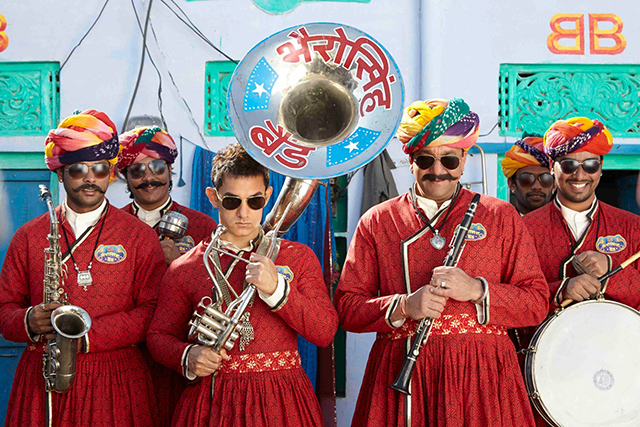One of the first and most intense film festivals I ever attended was the Kerala International Film Festival in Kerala, India. Ten days, over sixty films and way too many screenings later, I couldn’t even remember a plot line, let alone a cinematic style.
Luckily, the San Francisco South Asian International Film Festival (SFSAIFF), running Oct. 22-25 in San Francisco and Nov. 1 in Palo Alto, doesn’t try to do it all. Instead, festival co-directors Anuj Vaidya and Ivan Jaigirdar curate a manageable tasting menu for both the novice South Asian film-goer and the experienced viewer. But even tasting menus benefit from suggestions. Here’s what I’m most looking forward to:
Stereotype-Exploding Narratives
Seeing the same representatives of the South Asian community over and over gets old. The SFSAIFF offers a chance to combat stereotypes in the media and redefine what it means to be South Asian. Vaidya and Jaigirdir aim to include people usually on the periphery as well as films that are subversive and thought provoking.
On Oct. 23, Dheepan, the winner of the Palme d’Or honor at the Cannes Film Festival this year, shows at New People Cinema. The film details the lives of three Sri Lankan immigrants, former Tamil Tigers, as they resettle in the Parisian suburbs — not your traditional model minority trope.
M. Manikandan’s The Crow’s Egg, showing Oct. 24 at the Castro, tells the story of two brothers in search of pizza. “It’s like the Indian Slumdog Millionaire in some senses. It is really empowering in an odd way,” Jaigirdir says.
And it is Tanuj Chopra’s Brown Girl Stoner Film, a work in progress screening Oct. 24 at New People Cinema, that I am most looking forward to, not only because it’s described as a “smart and sassy comedy.” It’s the story of two young women stuck in a park with a big bag of weed. What more could you want?
Nuances of Gender Dynamics
South Asian gender issues are complex. In some ways India is progressive, providing the option (at least on many official forms) to self-identify beyond a male/female binary. However, violence against women and unequal power dynamics between genders undermine such gestures of egalitarianism. In separate discussions with Vaidya and Jaigirdir, they both named a number of films addressing gender.
These are: the Sri Lankan documentary Silence in the Courts, showing Oct. 25 at New People Cinema, the story of two women in search for justice after being raped by a court judge; the short Mardistan/Macholand, also screening Oct. 25 at New People, exploring masculinity through the voices of four men from Punjab; and Petals in the Dust, showing Nov. 1 at CineArts in Palo Alto, which takes on issues of infanticide, sex-selective abortions and medical neglect.
“The issue does not just effect women,” says Vaidya. “I think these films do break stereotypes of Indian masculinity.”
[Disclaimer: Two short films by KQED Arts video producer Abhi Singh are also showing as part of the shorts program Coast to Coast: Mumbai to the Mission, Oct. 25 at New People Cinema.]
An Evolving Look at Film

The origins of what is now the SFSAIFF date back to 2002, when it consisted of a series of monthly screenings. It evolved into a platform for South Asian cinema that is open to both emerging filmmakers and the occasional Bollywood film. This year that film is PK, showing Oct. 24 at the Castro. While it’s a bit over the top in terms of drama, as many Bollywood films are, the comedy still contains subtle lessons, and questions of religion and humanity.
All the Voices, or at Least Many
“The festival from the beginning has been about presenting voices from the various communities,” says Vaidya. The co-directors pride themselves in being open and inclusive to a wide range of stories and backgrounds. “It wouldn’t be a South Asian film festival if we didn’t have queer voices, Hindu voices, Muslims voices. Part of our mission is to have a variety of voices,” he says.
Though it’s admittedly impossible to keep track of all the films coming out of the South Asian region, Vaidya and Jaigirdir do their best. There’s only one short film I saw in India over the summer that I wish were included in this year’s program: Invisible Wings.
It’s a beautifully-shot story of a chai tea seller in southern India who travels around the world. Perhaps next year, it will grace the screens of the festival. For now, the short is being translated into multiple languages and screened in rural areas of India to spark discussion.
Community
As a bi-racial member of the South Asian community, it’s always nice to see events welcoming to a wide range of people while also nailing the nuances of what it means to be South Asian. There is no singular narrative.
Vaidya and Jaigirdir are sensitive to the changing demographics of the Bay Area and hope to entice audiences who have moved further south along the peninsula. Hence the full program on Nov. 1 in Palo Alto.
“As much as we are a South Asian film festival it is about transcending those identities as well,” Vaidya says. “At the end of the day it is important that we all connect.”
The San Francisco South Asian International Film Festival takes place Oct. 22-25 and Nov. 1 at various Bay Area theaters. For tickets and more information, visit thirdi.org.
* * *
This post originally appeared at KQED Arts and is cross-posted with permission.
Born and raised in California, Lakshmi is a journalist and educator currently based in Berkeley. Over the past few years, she has worked with newspapers, radio and magazines from Gaborone, Botswana, to Los Angeles. She is a graduate of Pitzer College where she studied global communications and studio arts. She is presently pursuing her master’s at UC Berkeley School of Journalism.












